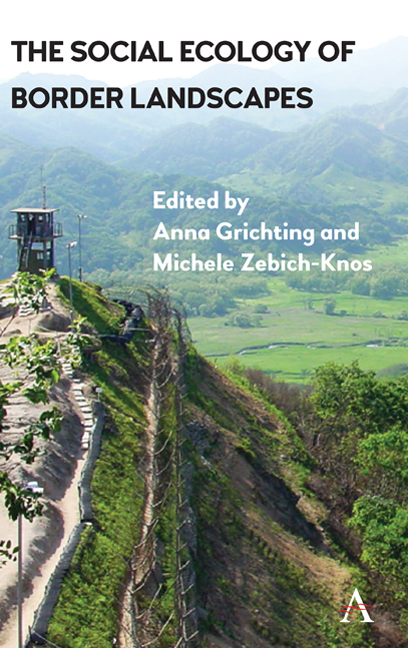Book contents
- Frontmatter
- Contents
- List of Illustrations
- Preface
- List of Contributors
- Introduction: Social Ecologies and Borderlands
- Part I FRAMES: MAPPING SOCIAL ECOLOGIES IN BORDER TERRITORIES
- Part II BRIDGES: RESILIENCE, RESTORATION AND RECLAMATION
- Part III CORRIDORS: CATALYSTS AND COLLABORATION IN CONFINED SPACES
- Part IV PORTALS: DIALOGUE, EXCEPTION AND RETERRITORIALIZATION
- Chapter Eleven Australia Day: A Social Ecology Dialogue across Aboriginal and White Cultures
- Chapter Twelve Re-legislating the Soil: Enclosures and Exception at the Amazon Frontiers
- Chapter Thirteen Mediterranean Edges: Reterritorializing Natural and Social Ecologies
- Conclusion: Making Sense of Social Ecology, Borders and the Environment
- Index
Chapter Twelve - Re-legislating the Soil: Enclosures and Exception at the Amazon Frontiers
from Part IV - PORTALS: DIALOGUE, EXCEPTION AND RETERRITORIALIZATION
Published online by Cambridge University Press: 10 January 2018
- Frontmatter
- Contents
- List of Illustrations
- Preface
- List of Contributors
- Introduction: Social Ecologies and Borderlands
- Part I FRAMES: MAPPING SOCIAL ECOLOGIES IN BORDER TERRITORIES
- Part II BRIDGES: RESILIENCE, RESTORATION AND RECLAMATION
- Part III CORRIDORS: CATALYSTS AND COLLABORATION IN CONFINED SPACES
- Part IV PORTALS: DIALOGUE, EXCEPTION AND RETERRITORIALIZATION
- Chapter Eleven Australia Day: A Social Ecology Dialogue across Aboriginal and White Cultures
- Chapter Twelve Re-legislating the Soil: Enclosures and Exception at the Amazon Frontiers
- Chapter Thirteen Mediterranean Edges: Reterritorializing Natural and Social Ecologies
- Conclusion: Making Sense of Social Ecology, Borders and the Environment
- Index
Summary
The robbery of the honey and the robbery of our safety, the robbery of communing and the taking of liberties, have gone hand in hand.
— Peter LinebaughAs the frontiers of development move deeper into Amazonia, opening up new soils to be integrated in the international market while simultaneously expanding enclosures toward common lands of local communities, the forest's geography turns into a contested terrain between dissident modes of relating to, appropriating and managing the environment. Enhancing global flows of natural resources presupposes the enforcement of new grids, barriers and borders on the ground, sectioning and reshaping the bounds between material ecologies and social networks, reconfiguring cultural and biophysical links between land and people. The lines that define these new border zones are multivalent, deep and thick, forged through a combination between legal mechanisms, scientific knowledge, cartographic techniques, spatial structures and political forces. Within and around them, at the intersection between different institutions, agents, materials and images through which the border exists and is performed, sites of conflict and dispute coagulate. They are frictious nodes in the fluid systems of global capital, points of resistance both to the geometries that power seeks to enforce, as well as to the border regime that structures categories of knowledge and representation by which we frame and relate to the nonhuman living world.
In what follows, Amazonia is described as a frontier space wherein the borders and boundaries that demarcate the distinctions and separations between society and nature, politics and ecology, are blurry and fuzzy, and ultimately irrelevant. In this border zone, the social and the ecological form an entangled milieu, since power and environment are inseparable components of a single, though highly conflictive and divided historical field of forces. Politics is interpreted as an active agent in the production of the natural environment, inasmuch as nature is read as a historical territory, which is intrinsically social and political. Amazonia, a global frontier of capitalist plunder, is also described as an epistemic frontier, a border ecology that challenges our laws, sciences and politics, unveiling their colonial foundations and the power structures that legitimate them.
- Type
- Chapter
- Information
- The Social Ecology of Border Landscapes , pp. 209 - 230Publisher: Anthem PressPrint publication year: 2017



